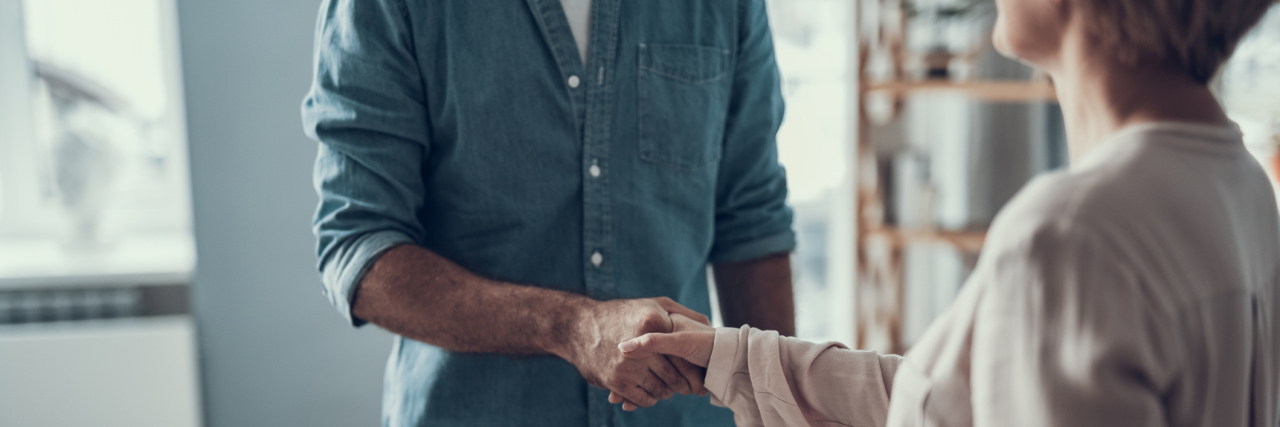I have seen a fair share of therapists in my life. Some good, and some left me questioning if therapy was even worth it. Each one has their own specialty and take on things and (hopefully) appeals to someone. If you are lucky, you will make a connection with your therapist early on and not have to shop around. This can be frustrating and completely unmotivating.
I was fortunate enough to make a connection with my therapist. I wasn’t seeing one at the time of my crisis, and I was put into a partial hospitalization program, while getting assigned a psychiatrist and a therapist at random. I didn’t have the option to do any research on them. I really lucked out because both are spectacular. They are well respected by their peers, and every time I tell someone in the industry who my care team is, they always react surprised and telling me just how lucky I am to have them. I couldn’t agree more.
I feel awful for the people that struggle to find one they connect with. I have two friends that have been nomadic in terms of landing with a therapist, which can be detrimental to your recovery. This led me to ask the question: what exactly makes a “great” therapist? Sure, this can be completely different for everyone, but I feel that there are certain qualities that are important in order to create connection and help overall effectiveness of the treatment.
1. They listen curiously.
This may seem like common sense, but what I mean is that the right therapist won’t just sit there, take notes first and ask questions later; in fact, they do the opposite. They listen and question…and maybe dig a little deeper than you anticipated going. Or they make you think about something in a completely different way. My therapist keeps me on my toes. Almost every session, she goes down a path that I wasn’t expecting, and I am left speechless as I contemplate the idea or suggestion that she has proposed.
2. They give you homework.
I know we all hate the word “homework” but a good therapist isn’t one who just sits through the 45 minute session and checks out until next time. You shouldn’t do that either! Therapy is an ongoing collaborative treatment strategy. A lot can happen between sessions. A great therapist will put the ball in your court and give you something to work on, read, research, practice, say or do every session. Recovery only works if you are ready, and if you are ready, it takes effort and work. A lot of work. My therapist regularly gives me articles to read, podcasts to listen to, things to ponder or question or conversations to have in between sessions. This keeps therapy fluid. It is ongoing, and isn’t just an every other week thing.
3. They are collaborative.
As I mentioned before, therapy is a two-way street. The discussions need to be two-way. Your treatment is specific to you. Therapy isn’t a “one size fits all” method. It is, and should be, completely individualized for you. In order to do that, your feedback and input is needed, otherwise your therapist will go only on what they know, and you most likely you won’t benefit from the treatment. They don’t just encourage you to be engaged, but they have a way of organically bringing it out of you. I openly disagree with some things my therapist suggests. It really helps dig a little deeper about myself and open a dialogue with her.
4. They aren’t your friend (though you wish they were).
The relationship I have with my therapist sometimes feels like we have been friends forever. She knows more things about me than most people, so it makes sense why it feels this way. We laugh together, I’ve cried in her presence. I have felt the whole spectrum of emotions in the walls of her office. Sometimes I forget that this is her job and she is being paid for this. This connection, however, makes me want to be more open with her and in turn, I feel that it makes the therapy sessions more effective.
5. They remain in your corner.
A therapist isn’t just someone you see every now and then and forget about. They are a critical member of your care team. They are more of a partner than anything. At times, I feel like she is my lawyer. I can be out in life and in a situation and have thought, “Man I really wish she was here to guide me.” I know that we will argue and have some deep discussions but, in the end, she has always been in my corner. She is steadfast by my side and genuinely wants to see me succeed. I can feel the authenticity when we talk. So, as I continue my recovery journey, I don’t want to just let myself down; I don’t want to let her down, either.
Seeking help can be difficult. It can be a huge hurdle to find the right connection — someone that makes you want to go see and talk to. Talking through your deepest emotions can leave you feeling very vulnerable and exposed. It is important that there is someone on the other end of that conversation that will ensure you feel comfortable and at ease. Opening up is, in the end, is extremely beneficial for your recovery.
Follow this journey on Moving Away From Darkness.
Getty image via YakobchukOlena.

